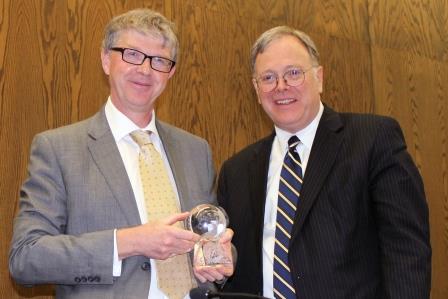





Professor Malcolm Evans OBE received the International Center for Law and Religion Studies Distinguished Service Award for 2013. In presenting the award at the opening session of the 20th Annual international Law and Religion Symposium, Center Director W. Cole Durham, Jr. made the following remarks:
It is with particular pleasure that I introduce Malcolm Evans, a longtime friend and colleague, and this year’s recipient of the International Center for Law and Religion Studies Distinguished Service Award. I first met Malcolm more years ago than either of us would like to admit when he was in charge of the quadrennial Congress of the International Association of Comparative Law, which was held in 1998 at his university in Bristol In the years since, Professor Evans has established himself as one of the leading figures in the field of International Human Rights Law. At Bristol, he has served as Dean of the Law Faculty and subsequently as what I call a super-dean, as the Dean of the Faculty of Social Sciences and Law. He is also Chair of the Board of Governors at Regent’s Park College Oxford—a Baptist College at Oxford.
In the international human rights setting, Malcolm currently chairs the United Nations Subcommittee on Prevention of Torture. This is some what misnamed because it is really an independent treaty body responsible for administering the Optional Protocol to the Convention against Torture and Other Cruel, Inhuman or Degrading Treatment or Punishment as it applies to its 75 Signatories and 69 parties. It is now the largest treaty body in the overall United Nations Human Rights System, with 25 members. It is also unique in that it has authority to visit places of detention in any of the 154 Parties to the Convention Against Torture, and significantly, does not need to wait for invitations to make visits. It also has the authority to work with state parties to set up national inspection systems. To the extent its mandate covers not only torture, but also other cruel, inhuman or degrading treatment, it also attends to religious situations in prisons, including such matters as access to clergy, dietary requirements and the like.
Professor Evans established himself as a leader in the law and religion field with the publication of his book, Religious Liberty and International Law in Europe, published in 1997. This rapidly emerged as the leading authority on religion issues in Europe and beyond. I will not take time to read off the many other influential international law texts and articles he has authored.
I had the opportunity to work with him for a decade on the Advisory Council on Freedom of Religion or Belief of the Organization for Security and Cooperation in Europe, where he was always one of the most energetic, efficient, and effective Council members, working on laws in numerous countries throughout the OSCE region, which stretches from Vancouver to Vladivostok, moving east. I was also able to work closely with Malcolm in founding the Oxford Journal of Law and Religion. In addition to serving as a Co-Editor-in-Chief of that journal, Malcolm is now the General Editor of the International and Comparative Law Quarterly. I can only say, I have trouble keeping up with the responsibility for editing one of these journals; Malcolm manages to handle two, on top of everything else he is doing.
Let me mention just a few of the additional activities in which Malcolm is engaged. He has served as a key adviser to the All Party Parliamentary Group on International Religious Freedom that has been organized in the Parliament of the United Kingdom. He oversaw the creation of its first report issued earlier this year: “Article 18: An Orphaned Right”. He is also a member of the United Kingdom Foreign Secretary’s Human Rights Advisory Group, where he has contributed very active support for freedom of religion or belief. He has helped coordinate bilateral efforts of the United Kingdom, the United States, and the European Union with respect to initiatives promoting freedom of religion or belief.
Any award we can give tonight pales in significance compared to recognition to being designated as an officer of the Order of the British Empire—recognition that is just a step below Knighthood in the British system. He described the ceremony of being given that honor, personally by the Queen of England. We cannot match that ceremony. Nonetheless, we take great pride in conferring our Distinguished Service Award this year on a longtime friend, outstanding scholar, and remarkable human rights worker, Professor Malcolm Evans.
